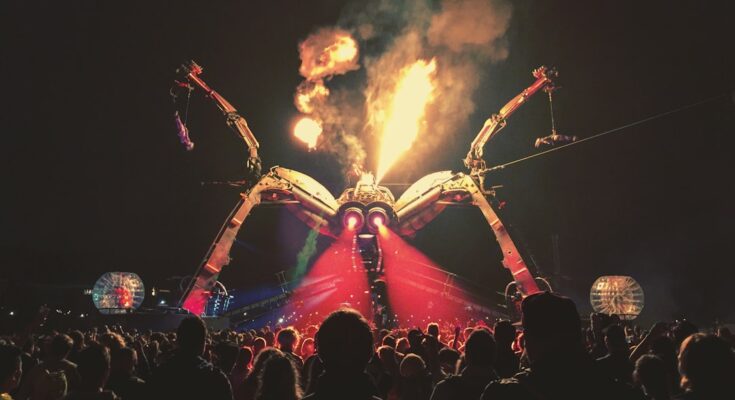Through their ability to draw millions of fans from all over the world, music festivals have become a global phenomenon. The increasing demand for live music experiences, the need for group celebration, and the chance for musicians to perform for a wide range of audiences are all factors contributing to the growth of music festivals. Music festivals have grown from intimate, specialized gatherings to expansive events that showcase a diverse array of musical styles, interactive exhibits, & art installations in recent times. Because they unite people in a common celebration of music, art, and culture, music festivals are appealing.
Key Takeaways
- Music festivals have become a global phenomenon, attracting millions of attendees each year.
- From Coachella in the US to Glastonbury in the UK, there are must-attend music festivals around the world that offer unique experiences and diverse lineups.
- Some music festivals go beyond the mainstream, offering unique experiences such as cultural immersion, wellness activities, and interactive art installations.
- Insider tips for making the most of your music festival experience include packing essentials, planning your schedule, and staying hydrated.
- The future of music festivals is marked by trends and innovations such as virtual reality experiences, cashless payments, and sustainability initiatives.
The impact of celebrity culture & the growth of social media are additional factors contributing to the worldwide appeal of music festivals. Music festivals have become a hub for influencers & celebrities since the introduction of apps like Instagram and Snapchat. These individuals frequently use these events as a platform to interact with their fan base and display their personal style. As a result, people are drawn to music festivals not just for the music but also for the chance to see and be seen. This has added to their allure.
Consequently, music festivals have emerged as a mainstay of the international entertainment landscape, with new events taking place annually in various nations to accommodate a wide variety of musical & cultural inclinations. Around the world, there are innumerable music festivals that are regarded by music lovers as must-attend occasions. Coachella, which takes place in Indio, California every year, is one such festival.
Coachella has become a global phenomenon, drawing attendees from all over the world with its star-studded lineup and stylish fashion scene. Another well-known festival is Glastonbury, which takes place in the United Kingdom and is well-known for both its varied musical lineup and dedication to sustainability. Glastonbury is a festival favourite due to its distinctive experience, which is enhanced by its expansive grounds and diverse lineup of performers. Tomorrowland, a music festival in Belgium, is a must-see for fans of electronic music.
Tomorrowland, one of the world’s most renowned electronic music festivals, is renowned for its intricate stage designs and immersive production. However, Lollapalooza in Chicago is a great option for those who enjoy rock & alternative music. Lollapalooza has established itself as a mainstay of North America’s summer festival season thanks to its eclectic lineup and exciting atmosphere. These are just a handful of the numerous international music festivals that are a must-see; each one offers a distinctive experience that suits a variety of musical and cultural preferences. Numerous distinctive and niche festivals that cater to particular musical genres and subcultures exist, even though mainstream music festivals are an amazing experience.
One event that honors black excellence and features a varied lineup of black musicians from punk, hip-hop, and soul is the Afropunk Festival, which is hosted in Brooklyn & other cities throughout the world. In addition, the festival offers activism seminars, art installations, & a bustling marketplace honoring black ingenuity and enterprise. Iceland Airwaves is another distinctive festival that takes place in Reykjavik and features international acts in addition to the finest of Iceland’s music scene. Discovering new music in an amazing setting is made possible by Iceland Airwaves’ unique experience, which includes intimate venues & a stunning natural backdrop. Also, MUTEK in Montreal is a festival that lovers of electronic & experimental music simply must attend.
MUTEK is a cutting-edge audiovisual venue that pushes the limits of digital art and electronic music with its avant-garde performances and installations. Exhilarating experiences can arise from attending music festivals, but in order to get the most out of your time there, careful planning and preparation are necessary. Being acquainted with the festival grounds and schedule beforehand is a crucial piece of advice. The majority of festivals provide schedules and maps on their websites or mobile apps, making it simple for visitors to plan their schedules & move around the grounds.
It’s also crucial to plan your packing carefully, taking into account things like the festival’s particular amenities, security guidelines, and weather. Prioritizing self-care throughout the festival is another insider tip. It’s critical to take breaks, drink plenty of water, and, if needed, protect your ears with earplugs when engaging in prolonged standing, dancing, or listening to loud music. When attending a music festival, it’s also critical to consider your own safety and wellbeing. This entails remaining vigilant about your surroundings, remaining with friends or meeting spots that have been set aside, and exercising caution when interacting with strangers.
You can guarantee a secure & pleasurable experience at any music festival by keeping these insider suggestions in mind. Numerous developments and trends are influencing how music festivals will develop in the future. The use of technology to enhance the festival experience is one noteworthy trend. It’s becoming more common for festivals to use tech-driven solutions to improve attendee convenience and engagement, from virtual reality activations to cashless payment systems. The focus on eco-friendly and sustainable practices is another trend. Many festivals are taking steps to lessen their environmental impact, encourage recycling, and reduce waste.
Examples of these steps include carbon offset programs, solar-powered stages, and reusable cups. In addition, diversity and inclusivity are receiving more attention when it comes to music festival programming and lineups. In addition to creating spaces that are welcoming to people of all identities & backgrounds, organizers are working to book a wider variety of artists. In addition, there is a growing desire for distinctive and immersive festival experiences, like wellness programs, interactive art exhibits, & food options that go beyond the typical festival fare. Future music festivals will be more dynamic and inclusive thanks to these trends & innovations, which are influencing attendees’ experiences globally. In the music festival industry, social responsibility and sustainability have received more attention in the last few years.
Reducing waste, conserving energy, & offsetting carbon emissions are just a few of the eco-friendly ways that many festivals are proactively reducing their impact on the environment. For instance, in order to keep organic waste out of landfills, some festivals have outlawed the use of single-use plastics on their property and instituted composting programs. Also, encouraging social responsibility through programs that aid charitable causes and local communities is becoming more and more important.
Several festivals are collaborating with nonprofits or neighborhood charities to generate money and awareness for significant social issues like mental health, LGBTQ+ rights, and educational access. In order to boost the local economy & provide chances for small businesses, some festivals also place a high priority on using local suppliers and vendors. Music festivals are lessening their environmental effect and improving the communities they serve by incorporating social responsibility and sustainability into their operations.
The local communities in which music festivals are held benefit greatly from them, as they are a major source of economic development, cultural enrichment, and community involvement. Festivals generate revenue for the local economy by drawing tourists from outside the area who spend money on lodging, dining, shopping, and other local establishments. An increase in employment and local economic growth may result from this tourist inflow. Also, festivals frequently offer chances for regional performers, artists, and merchants to exhibit their work and attract new audiences.
Also, by uniting people from all backgrounds to celebrate music and art, music festivals can promote a feeling of cultural exchange and community pride. Festivals frequently work with neighborhood associations or governmental bodies to develop educational or community outreach projects that benefit the locals long after the event ends. To ensure that they are good stewards of the communities they are in, festivals must, however, be aware of their impact on the resources and infrastructure in the area. Music festivals may keep improving the communities in which they are located by collaborating with neighborhood stakeholders & putting sustainable practices into effect.
If you’re a music lover, you’ll definitely want to check out the article “2023 Music Trends: Exploring the Hottest Sounds Taking Over” to stay up to date on the latest music trends and discover new artists and genres. This article will give you insight into the direction that music is heading in and help you discover new music festivals to attend in the future.
FAQs
What are music festivals?
Music festivals are events that feature live music performances by a variety of artists and bands. They often take place over several days and can include multiple stages and genres of music.
What are some of the best music festivals around the world?
Some of the best music festivals around the world include Coachella in California, Glastonbury in the UK, Tomorrowland in Belgium, and Fuji Rock in Japan.
What genres of music are typically featured at music festivals?
Music festivals can feature a wide range of genres including rock, pop, electronic, hip-hop, indie, folk, and more. Some festivals are dedicated to specific genres, while others offer a mix of styles.
How can I find out about upcoming music festivals?
You can find information about upcoming music festivals through official festival websites, social media, music publications, and ticketing platforms. There are also dedicated websites and apps that provide comprehensive listings of music festivals around the world.
What should I consider when attending a music festival?
When attending a music festival, it’s important to consider factors such as the festival’s location, lineup, accommodations, transportation, and overall atmosphere. It’s also important to be prepared for varying weather conditions and to stay hydrated throughout the event.



